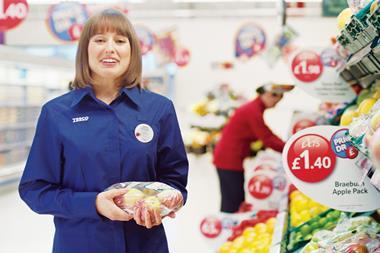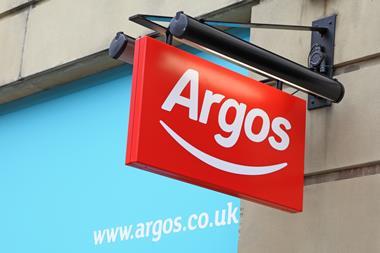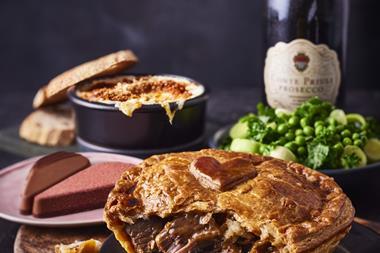Is a powerful supermarket chain a good or a bad thing? Tesco chief Sir Terry Leahy sets out the case for the defence
I will start with a paradox. Supermarkets deliver what millions want. They drive down prices. They drive up standards. They extend choice. They make life easier for people in a complicated world. They create jobs and generate taxes. They collect a lot of taxes. Supermarkets are good. They improve our quality of life.
But the better they do at delivering, the stronger they become. They use their buying power to beat the competition. The more they beat the competition, the more stores they open. The more they open, the more people worry they have too much power. So supermarkets are bad - they threaten our quality of life.
How do we resolve this paradox, square the circle, if you like?
Well, my contention is this. None of us in this industry should moderate our quest to follow the consumer and satisfy, if we can, what he or she wants. But in serving our customers, we should be aware of how we fit into the bigger picture, and of the impact of our actions on others. We should think how to strike the best possible balance for the long-term and not just think about today.
Striving for a sustainable model, where you try to balance the interests of your various stakeholders, isn’t just good for society. It makes long-term business sense.
We have to offer our customers what they want - or else we have no business. The better we are at doing that, the better we do. Competition is the mechanism by which we find out who is good at providing what the market wants. I find it hard to get my head round the notion that too much competition is a bad thing. It sometimes seems as though some people think that consumer power is fine - just so long as we don’t have too much of it. That we should benefit from lower prices, more choice and better food, but that those benefits shouldn’t go too far.
I struggle with the notion that we should only want supermarkets to be half-good, so that they don’t do too well. If you try to be half-good, you soon end up being all-bad.
In Britain we still sometimes seem to prefer the Good Loser. Being gracious in defeat is good. Losing is not. What I want to argue for is the Good Winner. Winning is good, but it is not enough. It is what you do with it that matters.
We all know that supermarkets come in for a fair amount of stick. Here are some of the things that are said about us. We destroy corner shops. We tear the hearts out of local communities. We concrete over fields and cause millions of people to sit in traffic jams. We squeeze our suppliers and are bad for British farming. We encourage people to eat unhealthily. We are responsible for an epidemic of obesity. And that’s just the more polite things.
Companies like Tesco need to be sensitive to this kind of concern, but we have been successful because we are good at finding out what customers want and giving it to them in their busy lives. We reflect what people want and have become very good at picking up how that changes. We hold a mirror up to a changing society, rather than shaping it. And strong supermarkets can deliver a whole range of benefits to all parts of society, from consumers to suppliers.
Let me start with consumers. In recent years, because of the volumes we generate with 12 million people coming to our UK stores a week, we have been able to cut prices by 11% in real terms.
That’s good news for all consumers, but particularly for the less well-off, as it means that more people can afford to buy decent, fresh food. So it’s perhaps no surprise that research shows that three-quarters of people who don’t live near a supermarket say that they would like to have one near them.
In IGD research, 82% of people said they were quite or very satisfied with their local choice of store and 79% of people thought that there was a competitive local market. This does not seem to me to provide evidence that consumers feel that supermarkets are over-mighty or that they are being denied choice as a result.
Supermarkets are often accused of blighting the high street, of sucking the life out of an area, of damaging market towns. In the UK, much of Tesco’s recent growth has come in areas of economic regeneration where we have reclaimed derelict land and helped breath life back into a community. OK, you say, that’s fine for inner cities. What about market towns? Independent planning consultants looked at our new store in Beverley, which we built on the site of the old cattle market. The study found that Tesco acted as a magnet. Two-thirds of our customers visit other stores in the town centre, and local business leaders say that it has boosted Beverley’s reputation as a place where people want to go and shop.
Next, we are accused of encouraging people to eat unhealthily, that in our pursuit of profit we damage public health. I would argue that by keeping prices low, we have helped those on fixed budgets to buy better and fresher food. Last year, our sales of fruit and veg rose by 10%, but the increase was even bigger among our poorer customers.
Now, it is for their relationship with suppliers that supermarkets perhaps come in for most criticism. There obviously are tensions and trade-offs. It’s a tough, competitive market and I do not claim we always get things right.
But we need strong and successful suppliers as much as suppliers need us. Long-term relationships are essential to a well-run business, and it doesn’t make sense for us to jeopardise that for short-term gain. We are a volume business, not a high-margin business, and if we can grow volume together with our suppliers, both of us benefit. The key to a good relationship is trust, and I know there is work for us to do in building that trust. One of the things we are trying to do is make it easier for suppliers to give us anonymous feedback.
Where we can work together with suppliers for the long term, the results for us both can be striking. Until recently, for example, we had to import cauliflowers from Spain. By working with growers in Cornwall we have been able to secure a year-round supply from our home market. As the biggest customer of British agriculture, we need British agriculture to do well.
Price is important to our customers, but so are locally grown products and we take our responsibilities here very seriously. We now stock over 7,000 regional lines, including 500 from Welsh suppliers and over 1,000 from Scottish suppliers, and in Northern Ireland there are an additional 1000 lines.
So size does not have to mean a top-down, monolithic approach that snuffs out regional diversity. On the contrary, it can be the engine for taking local products and putting them on the national stage.
Competitive success is what makes all of these things possible. But winning brings responsibilities with it and there is the need for us to build a genuine partnership - with our customers, staff, local government, local communities, suppliers.
Overall, I do think it is possible to square the circle, to resolve the paradox I spelt out at the start. The key is balance, and we have as much interest in getting that balance right as anyone else. Our relationship with our customers is based on trust. If we do not act properly towards all stakeholders, we will lose that trust. So it is as much a commercial as it is a social imperative to treat others as we would like to be treated ourselves.
The above article is a condensed version of a speech delivered by Sir Terry to the IGD annual convention.
I will start with a paradox. Supermarkets deliver what millions want. They drive down prices. They drive up standards. They extend choice. They make life easier for people in a complicated world. They create jobs and generate taxes. They collect a lot of taxes. Supermarkets are good. They improve our quality of life.
But the better they do at delivering, the stronger they become. They use their buying power to beat the competition. The more they beat the competition, the more stores they open. The more they open, the more people worry they have too much power. So supermarkets are bad - they threaten our quality of life.
How do we resolve this paradox, square the circle, if you like?
Well, my contention is this. None of us in this industry should moderate our quest to follow the consumer and satisfy, if we can, what he or she wants. But in serving our customers, we should be aware of how we fit into the bigger picture, and of the impact of our actions on others. We should think how to strike the best possible balance for the long-term and not just think about today.
Striving for a sustainable model, where you try to balance the interests of your various stakeholders, isn’t just good for society. It makes long-term business sense.
We have to offer our customers what they want - or else we have no business. The better we are at doing that, the better we do. Competition is the mechanism by which we find out who is good at providing what the market wants. I find it hard to get my head round the notion that too much competition is a bad thing. It sometimes seems as though some people think that consumer power is fine - just so long as we don’t have too much of it. That we should benefit from lower prices, more choice and better food, but that those benefits shouldn’t go too far.
I struggle with the notion that we should only want supermarkets to be half-good, so that they don’t do too well. If you try to be half-good, you soon end up being all-bad.
In Britain we still sometimes seem to prefer the Good Loser. Being gracious in defeat is good. Losing is not. What I want to argue for is the Good Winner. Winning is good, but it is not enough. It is what you do with it that matters.
We all know that supermarkets come in for a fair amount of stick. Here are some of the things that are said about us. We destroy corner shops. We tear the hearts out of local communities. We concrete over fields and cause millions of people to sit in traffic jams. We squeeze our suppliers and are bad for British farming. We encourage people to eat unhealthily. We are responsible for an epidemic of obesity. And that’s just the more polite things.
Companies like Tesco need to be sensitive to this kind of concern, but we have been successful because we are good at finding out what customers want and giving it to them in their busy lives. We reflect what people want and have become very good at picking up how that changes. We hold a mirror up to a changing society, rather than shaping it. And strong supermarkets can deliver a whole range of benefits to all parts of society, from consumers to suppliers.
Let me start with consumers. In recent years, because of the volumes we generate with 12 million people coming to our UK stores a week, we have been able to cut prices by 11% in real terms.
That’s good news for all consumers, but particularly for the less well-off, as it means that more people can afford to buy decent, fresh food. So it’s perhaps no surprise that research shows that three-quarters of people who don’t live near a supermarket say that they would like to have one near them.
In IGD research, 82% of people said they were quite or very satisfied with their local choice of store and 79% of people thought that there was a competitive local market. This does not seem to me to provide evidence that consumers feel that supermarkets are over-mighty or that they are being denied choice as a result.
Supermarkets are often accused of blighting the high street, of sucking the life out of an area, of damaging market towns. In the UK, much of Tesco’s recent growth has come in areas of economic regeneration where we have reclaimed derelict land and helped breath life back into a community. OK, you say, that’s fine for inner cities. What about market towns? Independent planning consultants looked at our new store in Beverley, which we built on the site of the old cattle market. The study found that Tesco acted as a magnet. Two-thirds of our customers visit other stores in the town centre, and local business leaders say that it has boosted Beverley’s reputation as a place where people want to go and shop.
Next, we are accused of encouraging people to eat unhealthily, that in our pursuit of profit we damage public health. I would argue that by keeping prices low, we have helped those on fixed budgets to buy better and fresher food. Last year, our sales of fruit and veg rose by 10%, but the increase was even bigger among our poorer customers.
Now, it is for their relationship with suppliers that supermarkets perhaps come in for most criticism. There obviously are tensions and trade-offs. It’s a tough, competitive market and I do not claim we always get things right.
But we need strong and successful suppliers as much as suppliers need us. Long-term relationships are essential to a well-run business, and it doesn’t make sense for us to jeopardise that for short-term gain. We are a volume business, not a high-margin business, and if we can grow volume together with our suppliers, both of us benefit. The key to a good relationship is trust, and I know there is work for us to do in building that trust. One of the things we are trying to do is make it easier for suppliers to give us anonymous feedback.
Where we can work together with suppliers for the long term, the results for us both can be striking. Until recently, for example, we had to import cauliflowers from Spain. By working with growers in Cornwall we have been able to secure a year-round supply from our home market. As the biggest customer of British agriculture, we need British agriculture to do well.
Price is important to our customers, but so are locally grown products and we take our responsibilities here very seriously. We now stock over 7,000 regional lines, including 500 from Welsh suppliers and over 1,000 from Scottish suppliers, and in Northern Ireland there are an additional 1000 lines.
So size does not have to mean a top-down, monolithic approach that snuffs out regional diversity. On the contrary, it can be the engine for taking local products and putting them on the national stage.
Competitive success is what makes all of these things possible. But winning brings responsibilities with it and there is the need for us to build a genuine partnership - with our customers, staff, local government, local communities, suppliers.
Overall, I do think it is possible to square the circle, to resolve the paradox I spelt out at the start. The key is balance, and we have as much interest in getting that balance right as anyone else. Our relationship with our customers is based on trust. If we do not act properly towards all stakeholders, we will lose that trust. So it is as much a commercial as it is a social imperative to treat others as we would like to be treated ourselves.
The above article is a condensed version of a speech delivered by Sir Terry to the IGD annual convention.



















No comments yet